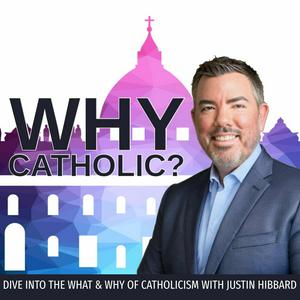In continuation of our series on the 21 Ecumenical Councils, Justin Hibbard talks about the Council of Florence, which occurred in Basel, Ferrara, Florence, and Rome. What began as an attempt to thwart papal supremacy led to one of the most potentially significant councils in history as the Eastern Greek Church united with the Western Latin Church. Would that unity survive?
SOCIAL LINKS
* Follow Why Catholic on Instagram.
* Subscribe to Why Catholic on YouTube.
* Follow Justin on Facebook.
SOURCES:
* The Ecumenical Councils of the Catholic Church: A History by Joseph Kelly
* Video: General Councils 12: The Councils of Lyons II & Florence - Fr Timothy Matkin - St Francis Dallas
* Papal Encyclicals Online: The Council of Florence
* Catholic Encyclopedia: The Council of Florence
* Ancient Faith Radio: Bishops-Part 42: The Council of Florence (Orthodox Source)
* Laetentur Caeli
* Episode 63: Not all Catholics are Roman Catholic
* Shameless Popery: Why I’m not Orthodox
PREVIOUS EPISODES IN THIS SERIES
* Episode 146: Introduction to the 21 Ecumenical Councils
* Episode 147: The World that Led to the Council of Nicaea
* Episode 148: The First Council of Nicaea (325)
* Episode 149: From Nicaea to Constantinople
* Episode 150: The First Council of Constantinople (381)
* Episode 151: The Council of Ephesus (431)
* Episode 152: The Council of Chalcedon (451)
* Episode 153: The Second Council of Constantinople (553)
* Episode 154: War Among the Monotheists
* Episode 155: The Third Council of Constantinople (680-681)
* Episode 156: The Second Council of Nicaea (787)
* Episode 157: Reflections on the First Seven Ecumenical Councils
* Episode 158: The Fourth Council of Constantinople (869-870)
* Episode 159: The Great Schism
* Episode 160: The First Lateran Council (1123)
* Episode 161: The Second Lateran Council (1139)
* Episode 162: The Third Lateran Council (1179)
* Episode 163: The Fourth Lateran Council (1215)
* Episode 164: The First Council of Lyon (1245)
* Episode 165: The Second Council of Lyon (1274)
* Episode 166: The Council of Vienne (1311-1312)
* Episode 167: The Avignon Papacy & The Great Western Schism
* Episode 168: The Council of Constance (1414-1418)
Get full access to Why Catholic? at whycatholic.substack.com/subscribe


